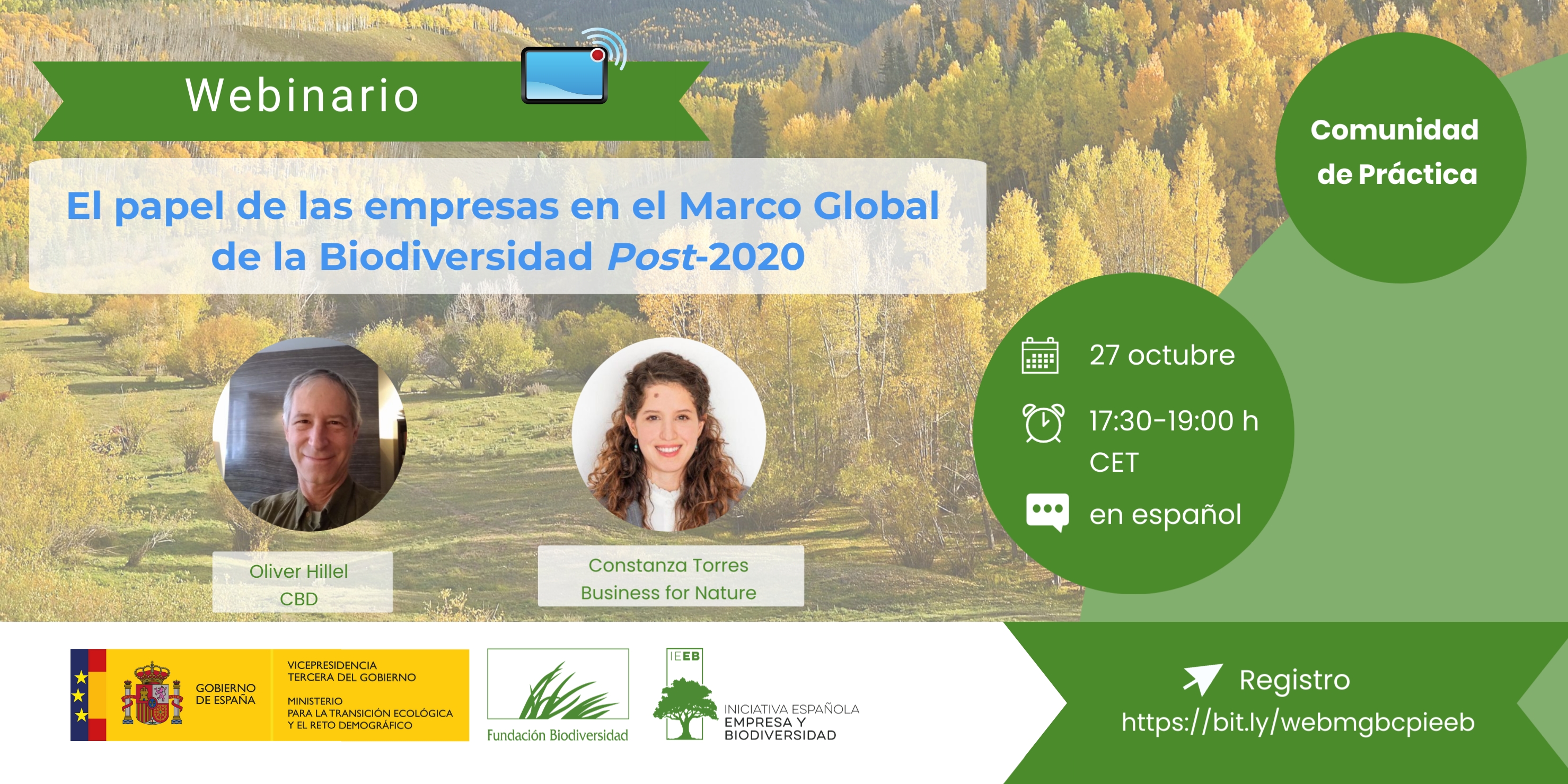The post-2020 Global Biodiversity Framework and the business sector. Implications and Call to Action

We are at a key moment with just over a month left for the adoption of the most relevant global agreement for the planet’s diversity that will be applied over the next decade and that will be adopted during COP 15 of the United Nations Convention on Biological Diversity (COP 15 CBD): the post-2020 Global Biodiversity Framework (post-2020 GBM).
The role that companies and financial institutions will play will be decisive in guaranteeing compliance with the objectives and goals set out in the proposed universal agreement. Precisely to bring the Spanish business and financial community closer to the implications that the post-2020 MGB will have for them, the IEEB organized a webinar on October 27 within the framework of its new Community of Practice to offer updated information on the status of the negotiations of the text of the framework that will be approved during the COP 15 CBD next December in Montreal (Canada) and the “tools and initiatives of transformation that will support change in the business and financial sector by promoting the integration of biodiversity issues into their decision-making processes and financial mechanisms,” said Victoria Pérez, coordinator of the Green Economy and Employment Area of the Biodiversity Foundation.
The adoption of the post-2020 MGB will result in actions, policies and regulations, both at the regional and national levels, which will have direct consequences on companies’ operations and business models. “In the implementation process, new business and action opportunities will arise for the private sector in the field of identifying dependencies and impacts, working with supply chains or the evolution of financial instruments to invest in green,” said the coordinator.
The role of companies in the post-2020 MGB
“All countries understand that biodiversity is an asset for development (…). Financial institutions, governments and the private sector recognize that it is essential to have a strategic instrument such as the post-2020 MGB that seeks to reverse the trend of destruction of nature and natural capital. Currently, we spend between 20 and 30 times more of natural resources than what is intended to protect them, with the serious consequences that this represents. For this reason, the way companies invest must change, so that financial flows are directed towards protecting natural capital and not destroying it,” explained Oliver Hillel, Head of the Biodiversity, Economy, Transformation and Innovation Unit of the Secretariat of the UN Convention on Biological Diversity.
As clarified by the head of the CBD, among the 22 measurable and concrete targets included in the post-2020 MGB that affect countries, companies and financial institutions, there are objectives that directly affect the private sector, “such as Target 14, which addresses how to assess the impacts and independence of nature, Target 15 on how to produce cleaner and more sustainable (Target 15), and Target 18, which addresses how to remove harmful incentives for biodiversity, public-private connections and financing of the green-blue economy and the circular economy”.
Hillel emphasized that the great challenge we face and for whose success the participation of the private sector and its leadership will be essential is that governments favor “that companies that are already proposing a green-blue-circular way of doing business are more successful than those that do not bet on it.”
To conclude, he highlighted some of the side events highlighted in the program of the next COP 15 CBD that will start on December 7, such as the day dedicated to finance, the Business Forum and the Science Forum. In the latter, the Intergovernmental Panel on Biodiversity and Ecosystem Services (IPBES) will show how it will work over the next two years on a methodological assessment on the impact and dependencies that different economic sectors have on biodiversity and nature’s contributions to people, known as the “business and biodiversity assessment”.
Business mobilization in the face of the post-2020 MGB
In view of the emblematic moment in which we find ourselves ahead of the COP 15 CBD, in which “world leaders have a responsibility to sign an agreement that gives our society and economy the opportunity to be more resilient and prosperous, but within planetary boundaries, companies play a fundamental role in achieving this”, Constanza Torres, Advocacy Associate of Business for Nature, stressed.
Business for Nature (BfN), a global coalition of business and conservation organizations that share the vision of living in harmony with nature by 2050, works to unify and demonstrate that there is a leading business voice calling on governments to adopt policies to reverse nature loss in this decade. Specifically, this vision is approached from two approaches: one focused on the mobilization of business action, and the other aimed at addressing political ambition to achieve a more nature-positive future from governments.
Some of the recent actions promoted by BfN in support of this vision are the publication of high-level business actions for nature, and the “Make it Mandatory” campaign. The first collects relevant information on how companies can assess their impacts on nature and make credible commitments on existing science-based platforms, so that these commitments can be implemented in their business models and operations. On the other hand, the “Make it Mandatory” campaign promotes that Target 15 of the new post-2020 Global Biodiversity Framework includes mandatory requirements for large companies and financial institutions to assess and report their impacts and dependencies on biodiversity, and that incentivize the business sector to incentivize companies to reduce their negative impacts by half and increase positive impacts.
To reinforce the appropriateness of this proposal, the representative of Business for Nature clarified why binding requirements make sense for companies and how the private sector can use frameworks such as the Natural Capital Protocol, the Science Based Targets for Nature Network (SBTN) and the Task Force on Nature-related Financial Disclosure (TNFD) to implement them.
“In a survey of 139 companies, 91% of them responded that binding requirements are necessary,” said Torres and encouraged participants to support the declaration addressed to governments by the business community to incorporate binding requirements on assessment and disclosure into their regulations by 2030. “This declaration does not represent an additional commitment for companies that already have a vision of sustainability and objectives set in their strategies. It allows us to add the voice of companies and demonstrate what is already being done well to ask governments for greater ambition,” he concluded.
Finally, an online survey was carried out with the participants to find out their opinion on the usefulness of the post-2020 MGB, their degree of experience in the evaluation, measurement and assessment of impacts and dependencies, their willingness to start working or deepen in these areas and their familiarity with the concept of “nature positive”. In line with the latter, BfN has recently published a paper on how companies and the financial sector can now contribute to a nature-positive future.
Links of interest
- Download the presentation.
- Download the summary.
- Download the results of the live consultations, part 1 and part 2.
- Link to the webinar recording: https://ieeb.fundacion-biodiversidad.es/recursos/webinario-el-papel-de-las-empresas-y-el-sector-financiero-en-el-marco-global-de-la
- Business for Nature publication How business and finance can contribute to a nature positive future now: https://static1.squarespace.com/static/5d777de8109c315fd22faf3a/t/634d83b8e5d4747f24935a8c/1666024380378/Nature+Positive+Discussion+Paper_Final.pdf




